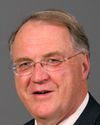Mr. Speaker, Canada and the associate minister are showing leadership on this issue. We are meeting with the partners and with the industry.
What we do know, and the Minister of Justice has reminded me, is that the New Democratic Party is against efforts to send a strong signal to those who would violate the justice system. That party is against the development of the energy sector, the aerospace sector and definitely against the interests of the Royal Canadian Air Force. It is against development.
That party is the no defence, no deterrents, no development party. That is what we see time and time again in the House.


















